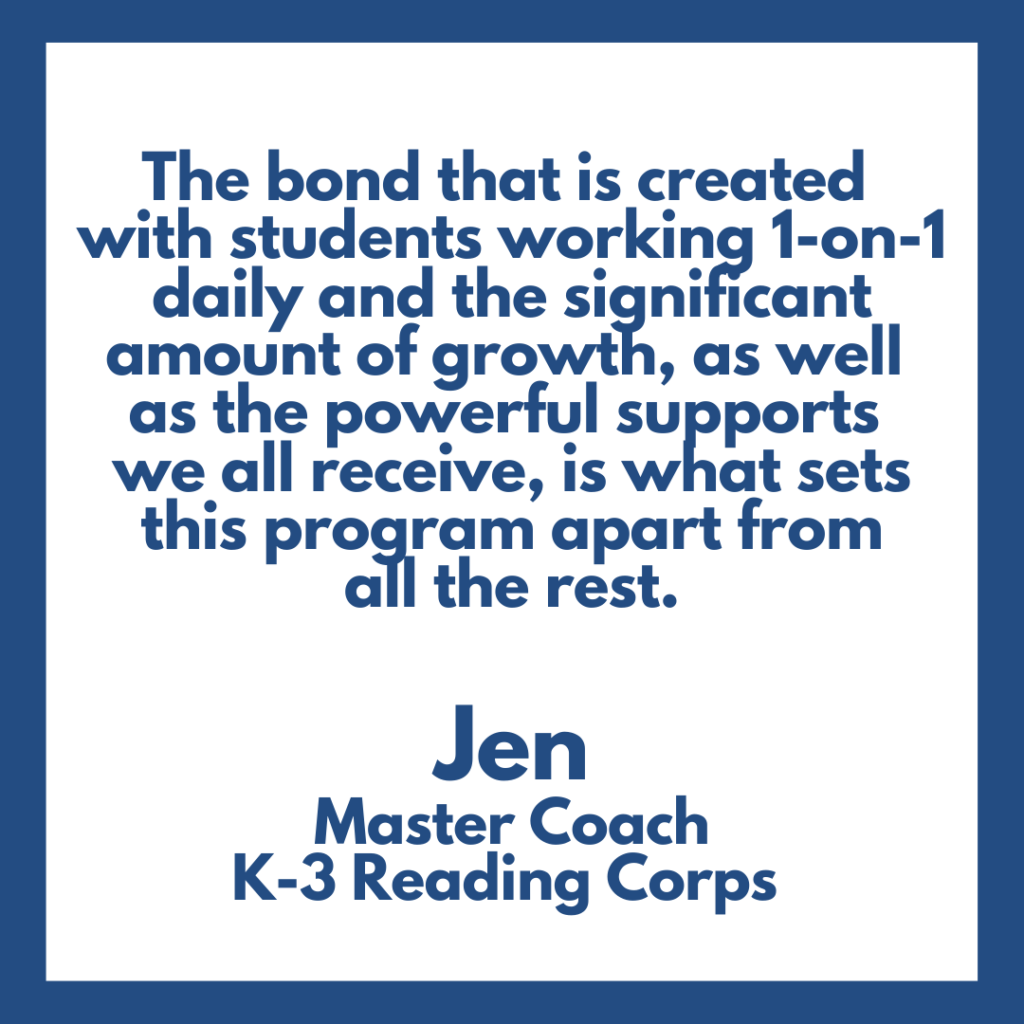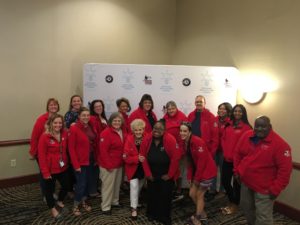
Student Growth – A Team Effort
Student Growth – A Team Effort
Interview with Jen
K-3 Reading Corps Master Coach
Jen Thomas is a five-year Master Coach for Michigan Education Corps’ Reading Corps program. She was originally connected with the program while teaching in Detroit, as a 6-8 Title 1 Intervention teacher, where she served as the Internal Coach for two years. After the second year, due to administration changes the program did not return for the third year. At the end of the third year, she reached out to the Program Team in hopes there would be opportunity to join the MEC team. Unfortunately, hiring was already finalized for the upcoming year; so she made a plan and connected in early February of the following year. As luck would have it, the program was expanding for the following school year and she was able to apply as a Master Coach. Prior to being a Master Coach, Jen served as a K-8 Reading Specialist, RTI committee chair, middle school English Language Arts teacher, Lead Teacher for learning center in Northern Michigan, and a After-School Instructor for 21st CCLC in Saginaw. She is currently supporting Michigan interventionists in Flint, and Muskegon.
 What is your position and responsibilities with Michigan Education Corps? As a Master Coach, my responsibility is to provide support to both the interventionists and internal coaches in implementation of anything pertaining to the Reading Corps program, such as assessments, interventions, and data analysis through the data management system. I attend trainings with the AmeriCorps members throughout the school year, provide support as the members transition into their service site, observe interventionists servicing their students and offer feedback to improve delivery and fidelity of the interventions. Alongside the Internal Coach, we spend time every month discussing each students progress; making intervention changes, adjustments in interventions to support growth, reviewing dosage, as well as next steps for exiting students.
What is your position and responsibilities with Michigan Education Corps? As a Master Coach, my responsibility is to provide support to both the interventionists and internal coaches in implementation of anything pertaining to the Reading Corps program, such as assessments, interventions, and data analysis through the data management system. I attend trainings with the AmeriCorps members throughout the school year, provide support as the members transition into their service site, observe interventionists servicing their students and offer feedback to improve delivery and fidelity of the interventions. Alongside the Internal Coach, we spend time every month discussing each students progress; making intervention changes, adjustments in interventions to support growth, reviewing dosage, as well as next steps for exiting students.
How are interventionists supported through our coaching model? The Master Coach provides guidance for the interventionists as an outside resource to learning and implementing the program. Support is provided through email, phone, and video meetings, as well as in-person in past school years. My job is to ensure that the members are prepared to administer assessments 3x per year with fidelity to ensure data is reliable and accurate. I also observe interventionists (at least) 1x monthly delivering the Reading Corps interventions, ensuring they’re following the script and to verify it is being implemented the same for all members at all sites supported. Although, we are required to meet monthly to analyze student progress, provide supports for interventions, etc., we communicate throughout the month to provide continual supports for interventions, student behavior/attendance, and data input into the RCDMS data management system.
How often do you meet with interventionists and internal coaches? Each month, the Master Coach and interventionists gather data from weekly progress monitoring, tutor log documentation from the intervention, dosage data reports for both the tutor and students, and observations from the Internal Coach and Master Coach are looked at to determine the student’s progress. Often when we meet, we will make adjustments to interventions or change the intervention, categorize students based on our Decision-Making Guidelines, review the caseload schedule, as well as reflect on feedback from the interventionist for each student.
Decision-Making Guidelines, review the caseload schedule, as well as reflect on feedback from the interventionist for each student.
What kind of impact does coaching have on interventionists? In my eyes, the “coaching” the Master Coach provides is a type of mentorship. We are there to support and guide the member as a leader of the program, so they can be successful in implementing the program. The Master Coach and Internal Coach are there to provide the necessary tools and knowledge to support the Interventionist in doing the work needed for student growth. My overall goal is to be that helping hand to guide the members towards success, as well as happiness during their service with Reading Corps.
What is one thing that you want people to know about the impact of Reading Corps? The impact Reading Corps has had on the members, as well as the students is what made me so fond of this program and wanting to stay connected to it after it was no longer at the school I was teaching at. When I became an Internal Coach, I witnessed first hand the power and importance of one-one-one services, data-driven decisions, and research-based interventions through Reading Corps. The structure and model of the program was what I strived for in my position while teaching. The members had the supports needed to be successful. Every piece is looked at carefully with an individual focus for every student and it’s always a team effort—working towards the same goal: student growth in reading. The bond that is created with students working one-on-one daily and the significant amount of growth, as well as the powerful supports we all receive, is what sets this program apart from all the rest.
Is there anything else you want to share about your experience working with Reading Corps? When I decided to leave my teaching position as a Reading Specialist to join the Michigan Education Corps team, I was nervous about not being assigned to a building, seeing the same students everyday, etc. But through this experience, I’ve gained so much more. I appreciate the opportunity I have to collaborate with districts across the state, supporting literacy for their community, meeting new educators, and most of all supporting the members who serve. I’ve always been a “helper” wanting to help others in anyway that I could and I’m able to do that in a vast way through coaching with MEC.






